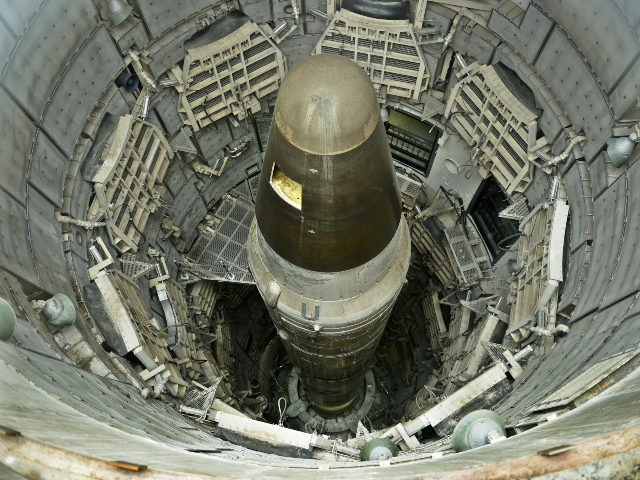Ukrainian First Deputy Foreign Minister Emine Dzhaparova on Wednesday claimed the Russian military is deploying nuclear weapons and their related infrastructure to the occupied Crimean Peninsula.
“Russia is actively expanding its military infrastructure for nuclear arms and reconstructing the infrastructure of Soviet-era nuclear warheads. Potential nuclear weapons carriers are already stationed on the peninsula,” she said, according to the Kyiv Post.
Ukraine, which under the Soviet Union experienced a major nuclear disaster when the Chernobyl Nuclear Power Plant melted down in 1986, denuclearized following its independence in 1991. The country is a signatory to the Treaty on the Non-Proliferation of Nuclear Weapons. In 1994, then-President Bill Clinton and then-Russian President Boris Yeltsin announced a disarmament deal in which Ukraine would transfer its nuclear arsenal to Moscow in exchange for guarantees Russia would respect Ukrainian sovereignty. Current Russian leader Vladimir Putin was then only an administrator in the St. Petersburg government and did not sign the accord.
Dzhaparova further emphasized Russia’s naval buildup in the Black Sea and its many alleged human rights abuses during the occupation, saying “Russia is сarrying out an artificial and deliberate replacement of the population of Crimea, crushing those disloyal to the regime and replacing them with hundreds of thousands of citizens, which amounts to war crimes.”
Moscow annexed the territory from Ukraine in 2014, prompting international outrage and many accusations of human rights abuses — including population replacement and conscription of the locals — but no significant military response. Kyiv has yet to launch any major military effort to recover Crimea, but President Volodymyr Zelensky made the questionable claim in April that “over a dozen” countries backed the armed liberation of the territory. He did not enumerate those nations nor did he specify if such support amounted to anything more than words of encouragement. In early June, Germany flatly rejected the prospect of sending military aid to Kyiv.
Ukraine’s allegations follow a massive Russian military buildup in Crimea and on its western border with the country, currently the battlefield in a protracted civil war between Russian-backed separatists and the Ukrainian military. The Russian Black Sea Fleet further conducted large-scale naval drills in Crimean waters during April of this year.
Russian naval forces, which include nuclear vessels, have moored in Crimea since the fall of the Soviet Union, even in the period prior to the 2014 annexation of the peninsula. Since then, however, Russia has moved to rapidly expand its naval influence, building up its forces in Crimea while announcing the renovation and construction of naval bases in the Mediterranean and Red Seas. In 2016, Moscow announced an overhaul to the Tartus, Syria, resupply station to allow it to harbor sizeable warships. In November 2020, Putin finalized plans for a full-scale naval base near Port Sudan in the Red Sea, which would allow the navy to project Russian influence far into the Indian Ocean.
Ukrainian calls to the West for tangible support have fallen largely on deaf ears. Following a bizarre, and inaccurate, claim from Zelensky that NATO had agreed to admit his nation into the military bloc, U.S. President Joe Biden adamantly asserted the country was too corrupt to secure entry, an aspect of Ukrainian politics with which Biden and his family reportedly have first-hand experience.
Under Biden, Washington has made strong claims of support for Ukraine’s territorial integrity but has repeatedly snubbed its government. Biden himself ignored pleas from Zelensky for a personal meeting prior to meeting with Putin. He further dropped American opposition to the Nord Stream 2 pipeline project, which will greatly increase western Europe’s dependence on Russia to meet its energy needs. Zelensky has vocally expressed surprise and disappointment with the Biden administration’s behavior.
A vassal of the Ottoman Empire for centuries, the Crimean Khanate — a Tatar state encompassing Crimea and its surrounding areas — became nominally independent under the Treaty of Küçük Kaynarca, which ended the Russo-Turkish War (1768-1774). The Russian Empire, however, maintained military dominance in the region and formally annexed the Khanate in 1783. The region remained part of a greater Russian state until the fall of the Soviet Union, despite numerous foreign invasions and separatist risings.

COMMENTS
Please let us know if you're having issues with commenting.